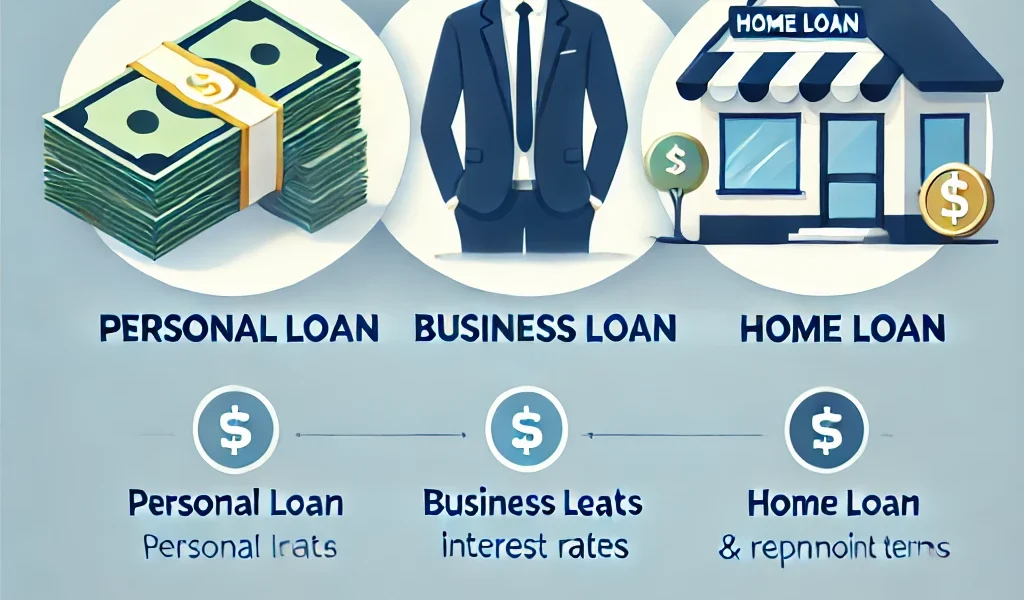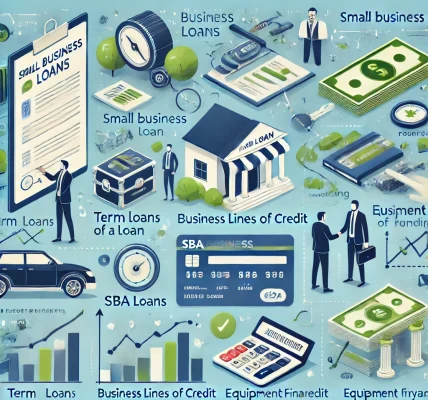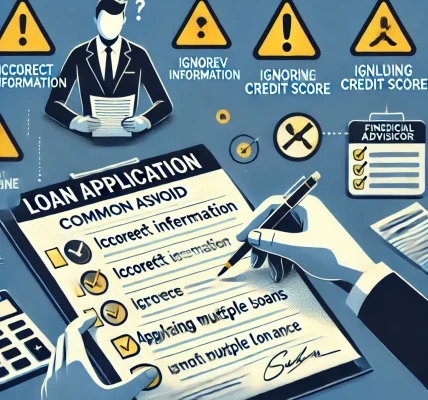Introduction
Loans play a crucial role in financing various needs, from personal expenses to business expansions and home purchases. However, loan policies vary significantly depending on the type of loan. Lenders have distinct criteria, terms, and approval processes for personal, business, and home loans. Understanding these differences can help borrowers make informed financial decisions and improve their chances of securing a loan on favorable terms.
In this comprehensive guide, we explore how loan policies differ for personal, business, and home loans, including eligibility criteria, interest rates, repayment terms, and regulatory considerations.
1. Personal Loan Policies
Personal loans are unsecured loans that individuals take out for various personal expenses, such as medical bills, travel, weddings, or debt consolidation. Since they are not backed by collateral, lenders assess creditworthiness based on income and credit score.
Eligibility Criteria
- Credit Score Requirement: Typically, a minimum credit score of 650-700 is required.
- Income Stability: Lenders assess the borrower’s monthly income to ensure repayment ability.
- Employment Status: Salaried and self-employed individuals can apply, but requirements may differ.
- Debt-to-Income Ratio: A lower debt-to-income ratio increases the chances of approval.
Interest Rates & Loan Amounts
- Interest Rates: 10% – 24% (varies based on creditworthiness and lender policies).
- Loan Amount: $1,000 – $50,000, depending on income and credit profile.
- Repayment Terms: 1 to 7 years.
Approval Process
- Online application process is usually quick.
- Credit score plays a major role in determining approval and interest rates.
- No collateral is required, making it accessible but potentially more expensive.
Pros & Cons
| Pros | Cons |
|---|---|
| Quick approval and disbursal | Higher interest rates compared to secured loans |
| No collateral required | Strict credit score requirements |
| Can be used for various purposes | Shorter repayment terms |
2. Business Loan Policies
Business loans are designed to fund small and large businesses, helping with startup costs, expansion, inventory purchases, or operational expenses. These loans can be secured or unsecured, and lenders assess business financials before approval.
Eligibility Criteria
- Credit Score: 650+ for unsecured loans; lower for secured loans.
- Business Age: At least 1-2 years of operational history preferred.
- Revenue & Financial Health: Banks require proof of revenue and profitability.
- Business Plan: Some lenders request a detailed business plan for loan approval.
Interest Rates & Loan Amounts
- Interest Rates: 6% – 20% (depends on loan type and lender policies).
- Loan Amount: $5,000 – $5,000,000.
- Repayment Terms: 1 to 25 years.
Approval Process
- Requires submission of business documents such as tax returns, balance sheets, and profit & loss statements.
- Secured business loans have lower interest rates but require collateral.
- Unsecured loans are available but have higher interest rates and strict eligibility.
Pros & Cons
| Pros | Cons |
| Access to larger loan amounts | Requires extensive documentation |
| Longer repayment terms | May need collateral for larger amounts |
| Lower interest rates for secured loans | Approval process can be slow |
3. Home Loan Policies
Home loans (mortgages) are used to purchase residential properties. These are secured loans where the house itself serves as collateral. Home loans typically have lower interest rates due to the collateral backing.
Eligibility Criteria
- Credit Score: Minimum 620 for conventional loans; 580 for FHA loans.
- Income & Employment History: Stable income proof is required.
- Loan-to-Value Ratio (LTV): Lenders finance up to 80%-90% of the property’s value.
- Debt-to-Income Ratio: Generally, a DTI below 43% is preferred.
Interest Rates & Loan Amounts
- Interest Rates: 3% – 7% (varies based on loan type and market conditions).
- Loan Amount: Based on property value and borrower’s income.
- Repayment Terms: 15 to 30 years.
Approval Process
- Involves property appraisal and legal documentation.
- Borrowers must provide proof of down payment (usually 10%-20%).
- Government-backed loans (FHA, VA, USDA) have relaxed eligibility but stricter property requirements.
Pros & Cons
| Pros | Cons |
| Low-interest rates compared to personal loans | Requires down payment |
| Long repayment tenure | Lengthy approval process |
| Tax benefits on interest payments | Risk of foreclosure if payments are missed |
4. Key Differences Between Personal, Business, and Home Loans
| Feature | Personal Loan | Business Loan | Home Loan |
| Purpose | Personal expenses | Business operations & growth | Property purchase |
| Collateral Required | No | Sometimes | Yes (Property) |
| Interest Rates | 10%-24% | 6%-20% | 3%-7% |
| Loan Amount | $1,000 – $50,000 | $5,000 – $5,000,000 | Based on property value |
| Repayment Terms | 1-7 years | 1-25 years | 15-30 years |
| Approval Time | Fast (few days) | Moderate to long | Long (weeks to months) |
5. Legal & Regulatory Considerations
1. Personal Loan Regulations
- Governed by consumer lending laws (Fair Credit Reporting Act, Truth in Lending Act).
- Lenders must disclose interest rates and fees transparently.
2. Business Loan Regulations
- Small Business Administration (SBA) provides guidelines for small business loans.
- Lenders must comply with anti-fraud and fair lending practices.
3. Home Loan Regulations
- Regulated by the Real Estate Settlement Procedures Act (RESPA) and Truth in Lending Act (TILA).
- Mortgage lenders must disclose loan terms, interest rates, and fees upfront.
Conclusion
Loan policies for personal, business, and home loans differ significantly in terms of eligibility, interest rates, collateral, and repayment terms. Understanding these differences helps borrowers choose the right loan based on their needs and financial situation.
Key Takeaways:
- Personal loans are unsecured and have higher interest rates but quick approvals.
- Business loans require financial documentation and can be secured or unsecured.
- Home loans have the lowest interest rates but require collateral and a longer approval process.




